Best Antitrust Lawyers in Córdoba
Share your needs with us, get contacted by law firms.
Free. Takes 2 min.
List of the best lawyers in Córdoba, Argentina
About Antitrust Law in Córdoba, Argentina
Antitrust law - also called competition law - in Córdoba is governed primarily by Argentine national competition rules and enforced by national authorities. These rules apply throughout the country, including the province of Córdoba, and aim to preserve free and fair competition among businesses. Typical objectives include preventing cartels and collusive agreements, stopping abusive conduct by dominant companies, and reviewing mergers and acquisitions that could substantially lessen competition. Both public enforcement by competition authorities and private claims by affected parties are possible in Argentina. Local businesses and individuals in Córdoba interact with the national enforcement framework while also relying on provincial institutions for complementary consumer and commercial matters.
Why You May Need a Lawyer
Competition matters can be complex and carry significant financial and reputational risks. You should consider hiring an antitrust lawyer in situations such as:
- Receiving a notification, request for information, or an inspection from a competition authority.
- Being accused of participating in a cartel, price fixing, market allocation, bid rigging, or related collusive practices.
- Facing allegations of abuse of a dominant position, such as exclusionary conduct, unfair pricing, or discriminatory terms.
- Planning a merger, acquisition, joint venture, or other concentration that may need a notification to the competition authority or a pre-closing clearance.
- Needing to design or review distribution, supply, or commercial agreements to ensure they comply with competition rules.
- Defending against private antitrust claims for damages or seeking to bring a damages claim as an affected party.
- Implementing or updating an internal competition compliance program and training staff on antitrust risks.
- Considering whether to apply for leniency or cooperate with an investigation into cartel activity.
Local Laws Overview
Key points to understand about the regulatory environment affecting Córdoba are:
- National framework. Competition law is established at the national level and applies across all provinces, including Córdoba. Provincial courts may hear private claims, but administrative enforcement, merger control, and investigations are handled by national bodies.
- Prohibited conduct. The law prohibits agreements and concerted practices that restrict competition, abuse of dominance, and other exclusionary practices. Typical examples are price fixing, market allocation, bid rigging, resale price maintenance in certain forms, and exclusionary tactics by dominant firms.
- Merger control. Concentrations may require prior notification and review when they meet statutory thresholds. The authority evaluates whether a transaction would substantially lessen competition and can approve, condition, or block a deal or impose remedies.
- Investigative tools. Authorities have administrative powers to request information, conduct inspections at business premises, and open investigations. Companies and representatives are expected to comply with lawful requests.
- Sanctions and remedies. Violations can lead to administrative fines, orders to cease illegal conduct, structural remedies or behavioral commitments in merger cases, and other corrective measures. Private parties may seek compensation for harm caused by anti-competitive conduct through civil suits.
- Leniency and cooperation. There are policies that encourage cartel participants to come forward and cooperate in exchange for reduced penalties or immunity in some cases. The availability and terms of leniency depend on the authority and the facts.
- Judicial review and civil actions. Decisions by competition authorities can be challenged before the courts. Affected parties can file civil claims for damages in provincial or federal courts, depending on jurisdictional rules and the nature of the claim.
Frequently Asked Questions
What is considered an antitrust violation in Argentina?
Antitrust violations include agreements or practices that restrict competition - for example, price fixing, market allocation, or bid rigging - and abusive conduct by a company with market power, such as exclusionary tactics that prevent rivals from competing. Merger transactions that substantially lessen competition may also be restricted.
Who enforces competition rules that affect Córdoba?
National competition authorities enforce competition law across Argentina. Administrative investigations, merger reviews, and sanctions are handled at the federal level. Provincial courts and institutions may become involved for private claims or complementary consumer protection issues.
Do I have to notify a merger or acquisition to the authorities?
That depends on whether the transaction meets the notification thresholds or other criteria set by the competition rules. Many transactions trigger mandatory notification, while smaller deals may not. A lawyer can help assess whether you must notify and guide you through the process.
What should I do if the competition authority requests documents or conducts an inspection?
Respond promptly and transparently, but coordinate with legal counsel before producing documents or answering questions. A lawyer will help protect privilege where possible, ensure compliance with legal obligations, and manage the response to minimize risk.
What penalties could a company face for antitrust violations?
Penalties can include administrative fines, orders to stop illegal conduct, behavioral or structural remedies in merger cases, and reputational harm. In addition, private parties may seek damages. The exact penalties depend on the nature of the conduct and the authority's findings.
Is there a leniency program for cartels?
Yes, Argentina has mechanisms that allow participants in cartels to seek leniency or reduced penalties if they are the first to come forward and actively cooperate with the investigation. The specific requirements and benefits vary, so early legal advice is essential.
Can individuals be held liable or only companies?
Primarily companies are subject to administrative sanctions, but in some cases individuals such as executives or managers may face consequences, including fines or professional discipline. Legal exposure depends on the facts and applicable rules.
Can a private company sue for damages if harmed by anti-competitive conduct?
Yes, harmed companies can bring civil claims for damages caused by anti-competitive conduct. Such suits may be brought in ordinary courts and require evidence of harm and causation. A successful claim can result in compensation, though litigation can be complex and lengthy.
How long does an antitrust investigation or merger review usually take?
Timelines vary widely. Merger reviews have statutory phases and specific review periods, but the process can be extended if remedies or further analysis are needed. Investigations into cartels or abuses of dominance can take many months or longer. Early planning and cooperation help manage timelines.
How can a business reduce antitrust risk?
Implement a written competition compliance program, train staff on antitrust risks, conduct regular legal audits of commercial agreements and pricing practices, seek legal clearance for complex transactions, and establish protocols for responding to government inquiries. Consult a lawyer to tailor these measures to your business.
Additional Resources
Useful resources and bodies to consider when seeking information or assistance include:
- The national competition authority responsible for enforcement and merger review.
- The government ministry or secretariat that houses competition functions and issues implementing regulations.
- The provincial Colegio de Abogados de la Provincia de Córdoba for referrals to local antitrust specialists and guidance on finding qualified counsel.
- Local university law faculties and legal clinics that may offer research, seminars, or specialist expertise on competition issues.
- Trade associations and chambers of commerce in Córdoba that can provide sector-specific context and compliance resources.
- International or regional organizations that publish comparative studies and guidance on competition law and compliance, which can help understand best practices.
Next Steps
If you think you need legal assistance for an antitrust matter in Córdoba, consider the following practical steps:
- Gather and preserve relevant documents and communications related to the issue, including contracts, pricing records, internal emails, and transaction documents.
- Stop any ongoing conduct you suspect may be problematic and isolate the relevant business units to prevent further exposure.
- Seek an initial consultation with an attorney experienced in Argentine competition law - ideally one familiar with cases in Córdoba or the relevant sector.
- If you are contacted by an authority, notify counsel immediately to coordinate the response and evaluate whether leniency or cooperation may apply.
- Consider conducting an internal compliance review and staff training to reduce future risks and demonstrate good faith to regulators.
- Request a clear engagement letter from your lawyer outlining scope, fees, and expected steps so you understand the process and costs.
Antitrust matters can be technically demanding and time sensitive. Prompt, informed action with qualified legal counsel will help protect your rights and business interests.
Lawzana helps you find the best lawyers and law firms in Córdoba through a curated and pre-screened list of qualified legal professionals. Our platform offers rankings and detailed profiles of attorneys and law firms, allowing you to compare based on practice areas, including Antitrust, experience, and client feedback.
Each profile includes a description of the firm's areas of practice, client reviews, team members and partners, year of establishment, spoken languages, office locations, contact information, social media presence, and any published articles or resources. Most firms on our platform speak English and are experienced in both local and international legal matters.
Get a quote from top-rated law firms in Córdoba, Argentina — quickly, securely, and without unnecessary hassle.
Disclaimer:
The information provided on this page is for general informational purposes only and does not constitute legal advice. While we strive to ensure the accuracy and relevance of the content, legal information may change over time, and interpretations of the law can vary. You should always consult with a qualified legal professional for advice specific to your situation.
We disclaim all liability for actions taken or not taken based on the content of this page. If you believe any information is incorrect or outdated, please contact us, and we will review and update it where appropriate.













